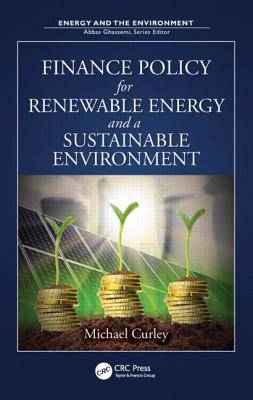
- Afhalen na 1 uur in een winkel met voorraad
- Gratis thuislevering in België vanaf € 30
- Ruim aanbod met 7 miljoen producten
- Afhalen na 1 uur in een winkel met voorraad
- Gratis thuislevering in België vanaf € 30
- Ruim aanbod met 7 miljoen producten
Finance Policy for Renewable Energy and a Sustainable Environment
Michael CurleyOmschrijving
Environmental finance is about creating the greatest environmental benefit for the largest number of people at the lowest possible cost. That is the first and most important principle listed in Finance Policy for Renewable Energy and a Sustainable Environment. Focusing on what the author considers to be the 23 principles of environmental finance, this text examines the key financial principles necessary to build strategies and adopt policies to deal effectively with environmental challenges. The text encourages making financial decisions based on science, not politics, and considers what it takes to design and execute environmental finance programs in the most cost-effective way possible.
Providing a historical overview of how we got to where we are now, and outlining the 23 principles needed to establish a stronger foundation for the future, this text presents the basic financial tools required to understand the concepts presented. It discusses the proper roles of grants, loans and guaranties, the concept and proper use of affordability, understanding leverage, and generating revenue streams for environmental programs. It also examines subsidies, financial risk reduction strategies, and the challenges posed by alternative energy as well as the next generation of environmental programs.
As it relates to how environmental projects and improvements are achieved, Finance Policy for Renewable Energy and a Sustainable Environment outlines the greatest benefits at the lowest possible cost to the public. This text is an ideal resource for upper-level undergraduate students in environmental engineering and business courses, as well as practicing environmental engineers.
Specificaties
Betrokkenen
- Auteur(s):
- Uitgeverij:
Inhoud
- Aantal bladzijden:
- 258
- Taal:
- Engels
- Reeks:
Eigenschappen
- Productcode (EAN):
- 9781439894194
- Verschijningsdatum:
- 18/03/2014
- Uitvoering:
- Hardcover
- Formaat:
- Genaaid
- Afmetingen:
- 157 mm x 234 mm
- Gewicht:
- 861 g

Alleen bij Standaard Boekhandel
Beoordelingen
We publiceren alleen reviews die voldoen aan de voorwaarden voor reviews. Bekijk onze voorwaarden voor reviews.











